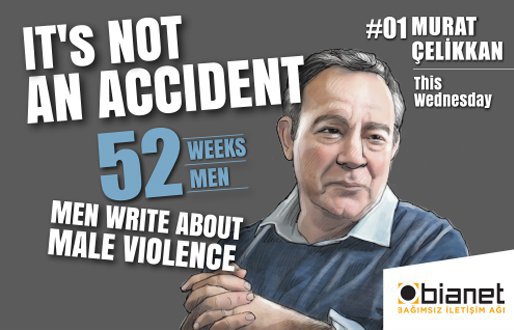Click to read the article in Turkish / Kurdish
I must have gone crazy for accepting to not only write about such a subject but also to be the man to write the first piece, but no I have not gone crazy! The reason I took this risk is because I believe it is high time for men to also speak up in the public sphere about manhood, masculinity and male violence. Of course, there is also the unbearable difficulty of rejecting bianet and Nadire [Mater].
Fortunately, we have come a long way from the meaningless stance of "I am against all sorts of violence" or the displays of manliness against the definition of "male violence", and have now reached a point where men also discuss and write about male violence. This was not a long process, spanning at most 5-10 years, however, considering that men killed almost 2,000 women in Turkey since 2010 according to the bianet male violence monitoring report, you can understand how heavy a price the women paid for it. Fear of women and misogyny cause both individual men and institutions to engage in inhumane practices against women. It always has and still does.
Of course, I do not claim that men engaging in the discipline of gender studies or discussing male violence will solve the problem for good. But I will take this opportunity to try to present my humble contribution and make my confessions.
As I owe my faults, which I acquired as male privilege, to testosterone and learned masculinity, I owe the fact that I have reached the stage of questioning myself on this subject almost entirely to women. I owe it to the women who took the risk of marrying me or being my girlfriend, or friend, or colleagues whom I spend so much time with; I owe it to the fact that they educated me with patience, tolerated my masculinities, and of course to their struggle for identity vis-a-vis a man. I must also mention the LGBTI+ contribution that helped me question and deal with manhood, and understand that it is an issue that goes beyond sexual orientation and heterosexism.
Reproducing time and again the very authority that we stand against, in the form of hegemonic masculinity must be the curse of us, the dissident men. Our dissident character mostly forgets to question the hegemony of patriarchy and heterosexism, but we think we question it nevertheless since we are dissidents.
I grew up in a political environment since my younger days, and in the socialist struggle since I was 17. Neither the question of woman, nor the institutional or social authority on who may fall in love or make love with whom had been on my agenda. Except for a couple of women who were serious about their work in the women's associations founded rather offhandedly and under ideological and organizational hegemony. But then again, the women who refused to stand behind the placard of this women's organization and instead marched with us in various demonstrations were more acceptable.
I truly met both of these groups at the Human Rights Association thanks to the rising gay and lesbian movement and the women's movement in the wake of the 1980 military coup. Even then, I was slightly piqued at the women who held separate demonstrations in the big wave of protests against the hunger strikes in prisons in 1990. Evidently, I had thoroughly imbibed one of the most orthodox interpretations of democratic centralism in Turkey!
Being thus interested in the issue of authority yet ignoring patriarchy must be rooted in my maleness. Obviously, I am not going to lecture anyone on this subject, there are women who can do this much better than me. But I must say that it is again to women that I owe my more comprehensive understanding of the issue of authority as well.
But male violence should not be solely a women's issue. While women, as the ones subjected to it, struggle against violence and its subjects that is us, grappling with the masculinities defined by various cultures across the world must be a concern, a struggle of the men as well.
Be it a man or a woman, there is no living being who is not startled by the sight of five men approaching on a deserted street in the middle of the night.
Men have the privilege of getting angry and resorting to violence when they cannot control or dominate something. When they do not have enough power, they are in the habit of supporting a handful of powerful men and committing violence for the continuity of those men's power. It must be kept in mind that systematic rape is an instrument of war.
Now let us come to the challenging part... The self-questioning.
Because if this account does not involve self-questioning and confessions, then it will run the risk of portraying yet another self-righteous attitude of men attempting to define and explain the violence that women experience. After all, this is a habit from time immemorial. For this reason, I think it is very important for men to speak not at women but among themselves and discuss their masculinities.
As far as I can remember, I have not inflicted physical or sexual violence against my colleagues, wives or girlfriends or children. I am saying "as far as I can remember" because some things that I took for granted as my natural right could have easily led my psychological violence tactics to result in physical violence. I hope I recall correctly, and that it has not led to that because men of course inflict this violence most readily against the ones who are closest to them. Especially if this closeness is established within the family, which is rendered untouchable and which protects the power of men with all its institutional and social infrastructure.
I have tried not to discriminate or dominate in my relationship and at my workplaces and have tried to look after the rights of workers. However, there is domination and control at the very root of male privileges which we perceive as our natural rights.
It has taken me a long time to control myself, to understand that I have been sort of gender-trained to view certain things as my right, and to start questioning these. I cannot say that I have worked it all out either. Even if not physical, I definitely exercised the privilege of violence.
I would like to take a look at some habits and privileges which I see as my natural right and thus am still trying to overcome...
Let us begin with a lighter one, "the right to interrupt"...
Men's right to interrupt: Even though I swiftly retreat, I have always been a vigorous debater. In the heat of discussion, speaking my mind, voicing what I know or believe to be true, regardless of whether someone else is talking at that moment, was a necessity bestowed upon me "by the power of the truths of manhood". There is something castrating about interrupting people when I am already speaking from a position of authority accorded by my age and rank. Doing this to someone who has reservations about taking the floor may have a censoring effect. This is the most frequently used tactic against women, practiced for years in order to dominate them, to destroy their self-confidence, and I do it too.
Solution: Do not participate in discussions if you do not have the tolerance. Do not interrupt the women when they are speaking, do not interrupt the women, do not interrupt, do not interrupt.
Men's right to self-righteousness: When one reaches a certain age, their experience and knowledge relatively increase as well. Before I know it, I have an opinion about almost everything. These opinions gradually turn into fixed ideas and judgements. I always have plenty of ideas in the meetings and discussions. I want to voice them. No, I think I must voice and share them. It sometimes comes out in the tone of "this is the truth, this is the right way to do it". However, theoretically I know that each time I take the floor, I make life more difficult for the younger people and for the women who have a harder time speaking up. Furthermore, I can start by accepting that I do not know everything and that other people may know certain subjects better than me.
Solution: Keeping some of the things I know to myself; trying to speak less, and in the time thus saved taking care to ensure that women and LGBTI+ individuals take the floor more often and have more say.
Men's right to joke around: I have always preferred comfortable work environments where people joke around with one another and have always tried to facilitate that. However, there is an unnamed hierarchy in every workplace and people do not feel equal, which is something I do not always take into consideration. I often forget not to joke about women's appearances, age or skills, which may make them feel bad. This too is a tactic used since time immemorial in order to dominate the other by making them feel weak and deficient.
Solution: Read and think more about everyday racism and sexism. Do not cross the line between joking around and mocking. Do not say things like "how tired you look today, couldn't you sleep well last night...look how much weight you've gained" especially not to women!
Men's right to shout: Trying to silence others by shouting at them is also a characteristic of man. The worst part is that I do this without realizing it. I only do it when arguing something but still I do it. I use a rather manly voice also reflecting my social class. I use it as a means of domination and even intimidation.
Solution: Do not raise your voice among your equals or less equals under any circumstances!
Men's right to not like and criticize: Especially in everyday life at home, men can easily position themselves as critics. Me too! "This rice isn't as delicious as you usually make it".
Solution: The right to not like and readily assume the position of a critic is a form of psychological violence for it makes the other person feel deficient and inadequate. It also means that you are fortifying your advantageous position by not taking a proactive stance or using your time and energy to find a solution. It is the reproduction of patriarchy over and over again.
Right to assert command over the domestic labor: This means that a man, including myself, thinks that the household chores should always be done by the women. Even if it is my chores. "The child is crying", "where is my blue shirt?", "why is the house messy?"
Solution: The solution is to remember that all these are actually things that I have to do but am not doing. I am trying to remind myself, before I say anything, that if the food is not delicious enough, or if the child is crying and needs tending to, or if I cannot find my stuff, it is my job to take care of these. On the bright side, if I do forget, there is someone at home to remind me.
Men's right to get angry: Another male privilege is to get angry when someone or something drives me crazy and insists on driving me crazy. Using anger to intimidate others. Swearing... I do that as well.
Solution: The solution is to keep reminding yourself that these are all displays of manliness and swearing is not only hurtful but also sexist.
Men's right to be offended or to punish: This is a right exercised after or along with the right to get angry. It is one of the best ways of punishing the other person and making them feel lonely and insecure. Establishing a dominion of silence when they say something or taking offence and pretending like they do not exist. The next step is to punish them and to make them feel it. I have done that, not a few times. It is a bad habit, an ugly form of masculinity.
Solution: Never try to establish hegemony over your close ones, lovers, colleagues through silence. It is very insulting. Taking offence and treating them like they do not exist is even more hurtful. Furthermore, it is a form of power that men often impose on everyone other than themselves.
I have mostly worked with women managers. As I said, I have learned a lot from them. Even when they did not do anything, they held a mirror up to me. But for the past six years, I have been working in a place staffed predominantly by women. I am learning a lot from them all but especially from my three women friends who are my co-managers. The primary lesson I have learned is to listen. I am learning, and they are still working with me. What else could I ask for! (MÇ/HK/TK/IG)
* Images: Kemal Gökhan Gürses
CLICK TO READ ALL "52 MEN 52 WEEKS" ARTICLES
|






